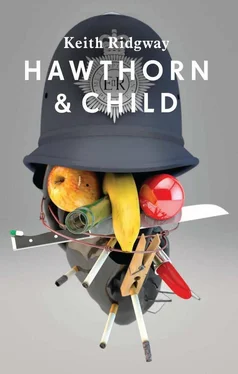He watched the kids; breathed out.
Trainer told me this story.
— Ashid lives in Walthamstow, somewhere around there, east, used to be a steward at White Hart Lane years ago. Anyway, now he works further north, up outside the M25 somewhere, for a bloke called Palmer, who has this garage. Called Mastersons, for no reason I know of. They beat panels, they cut and splice, pull apart, put together. They spray-paint. Most of their business is stolen cars. They have an arrangement with a man called Gull. Ashid’s role is mainly paperwork. A clever man with documents. Log books, bills of sale, transfer records, service records, repair reports. He does the accounts as well. Various accounts. The presentable and the bottom drawer, you know.
— So. All is well. They’re making a living. They keep an eye out. They pay careful attention to visitors they don’t know. They hire a local boy, they hire his brother, they pay them well, look after them, tell them nothing very much. They are circumspect. Canny. Smart as old goats. Palmer and Ashid. They’re never stupid. Never rash. Gull is happy. Every Christmas he gives each of them a hamper. Things for the kids. He remembers birthdays. Every so often little gifts — watches, computers, holidays. He will call Ashid on a Thursday, tell him that there are tickets at the airport for him and his wife, that there is a hotel booked in Cyprus or Budapest or Paris — go, have fun, have a good time, send me a postcard. Ashid always goes. He never says no. He’s a careful man.
— One day, one cold day in the winter, one afternoon, in January, in the bitter cold, Ashid is alone at the garage. He’s doing the paperwork for a car that’s come in the previous night. A four-wheel drive. A Land Rover. Palmer is out, he’s not there, he’s off somewhere on business. The yard is locked, the gates are secured, because of the Land Rover, which has been painted, which has had various changes made to the interior — it’s new, it’s about two weeks out of factory, it couldn’t be newer, and it’s sitting there, jacked up in the air, without wheels, without plates. Ashid needs to read some numbers from the engine. Some serial numbers. On various parts. He needs to know what they are before he decides what they will be. The boy has gone home early. Ashid can’t remember why. The boy plays football. He’s always going to football matches, maybe that’s it. His brother is sick at home. There is flu and there are various other winter ailments. Ashid’s wife is at home coughing, complaining about a draft in the bedroom at night. Their new windows, from Gull. They don’t all fit. Ashid has arranged for someone to come and fix them.
— He sighs and lies down on the flat trolley and slides himself under the Land Rover. He has a torch and a pen and a notebook. He’s not sure he’ll be able to see all the numbers he wants to see from here. He’ll have to wait until it’s off the jacks before he can get all of them.
— He hears a sound. He hears it but he doesn’t notice it. There are always sounds.
— He shines the torch up on the underside and sees a small plate to his left and squints at it, because the lettering is very small. He squints at it and it seems to come closer, and it does come closer. It comes closer because the whole Land Rover has come closer, it has fallen off its jacks, which is impossible, and it has crashed down on top of Ashid, knocking the pen and the torch and the notebook from his hands and pinning him to the ground. For a second he thinks he is dead. But he isn’t dead. There’s enough room beneath the Land Rover. It does not crush him. It has not fallen all the way. Then for a second he thinks he’s holding it up, because his arms are above his head somehow, and the underside of the vehicle is pressing against his elbows. But of course he knows he’s not holding it up. But he can’t move his arms. And he’s trapped.
— His mobile phone is in his trouser pocket but he can’t move his arms. There’s no one else in the garage. The garage is in the corner of a half-abandoned industrial estate. There is a plastics workshop at the other end. Out of shouting distance. There is a scrapyard where they sometimes hide cars, but that is even further away. On the other side of the yard wall there is simply open ground, waste ground, and then the trees start.
— He hears a voice. Close to him. Far too close to him. Palmer is his best hope but this isn’t Palmer. Palmer isn’t back. For a moment he cannot understand this voice. It seems too quiet, or too loud, too close, as if it is coming from a mouth that is beside his head. It is a low whispering voice, it sounds foreign, it’s unsettling, odd, as if the voice of someone unused to speaking.
— The vehicle will fall, fully, shortly, and you will be killed. It is prevented from falling by a small amount of metal, upon which the weight of the vehicle rests, but this small piece of metal is slipping, and the vehicle will fall, and because the wheels are off, the full weight of it will fall on you and you will undoubtedly be killed.
— Ashid doesn’t know what to say. He whimpers. He thinks that maybe this is God talking to him. Or maybe it’s part of himself. Maybe he is so close to death that part of him is already dead and this part of him is talking to him from the other side of death, telling him calmly what to expect. He feels very cold. He’s worried about pain. He finds that he is pressing his elbows painfully into the underside of the Land Rover. He realizes that this is ridiculous and he tries to stop doing it, but he’s afraid that if he relaxes his arms he will die.
— Save me, is what he says. Save me . He doesn’t even know if there is really someone there who can hear him or whether he is now praying, for the first time since childhood, or whether he is talking to the dead part of himself and in fact asking for death to come and save him.
— We can save you, says the strange voice, with no hesitation. And this confuses Ashid. He can hear only one voice, but now that he thinks about it, the voice sounds like it might be more than one voice, speaking at exactly the same time, with exactly the same inflections and emphasis and melody, and he says Save me again, and this time he is definitely speaking to whoever is speaking to him, and he hopes, he has hope.
— First , says the voice, say the voices, you must promise us something.
— Anything , says Ashid.
— You must hear our story. We will tell you our story. You must listen to our story. You must listen to all of it. From the start at the old sun, to the end at the black ditch. You must listen to the tale of Estator and his brethren, to the story of their lives, and you must hear the tale of Whigs and Haft. You must listen to it all. From start to finish. You must remember it all. From start to finish. And you must set it down so that it is known.
At this point Trainer stopped talking. He looked at his sirloin. Sniffed it. Poked it around the plate with his fork. He ordered more tea. We were in a café in Hackney. He didn’t eat any of the steak. I think he’d ordered it as a sort of joke. Rare and bloody on a white plate.
— It is unknown, he said, and then paused. It is uncertain, debated, in dispute, as to whether Ashid heard the story of Estator at this point, while still trapped beneath the Land Rover. Or whether he was saved first and was then told the story. What is known is that Palmer returned to the garage to find the Land Rover belly down on the floor of the yard, with the jacks buckled and crushed, and Ashid nowhere to be seen. Palmer called in the boys, sick or not, football or not, and they lifted the car, they winched it up, Palmer expecting to see the crushed body of his friend, but there was only the snapped flat trolley, a torch, a pen and a notebook. And a smell, like dogs or donkeys.
Читать дальше












